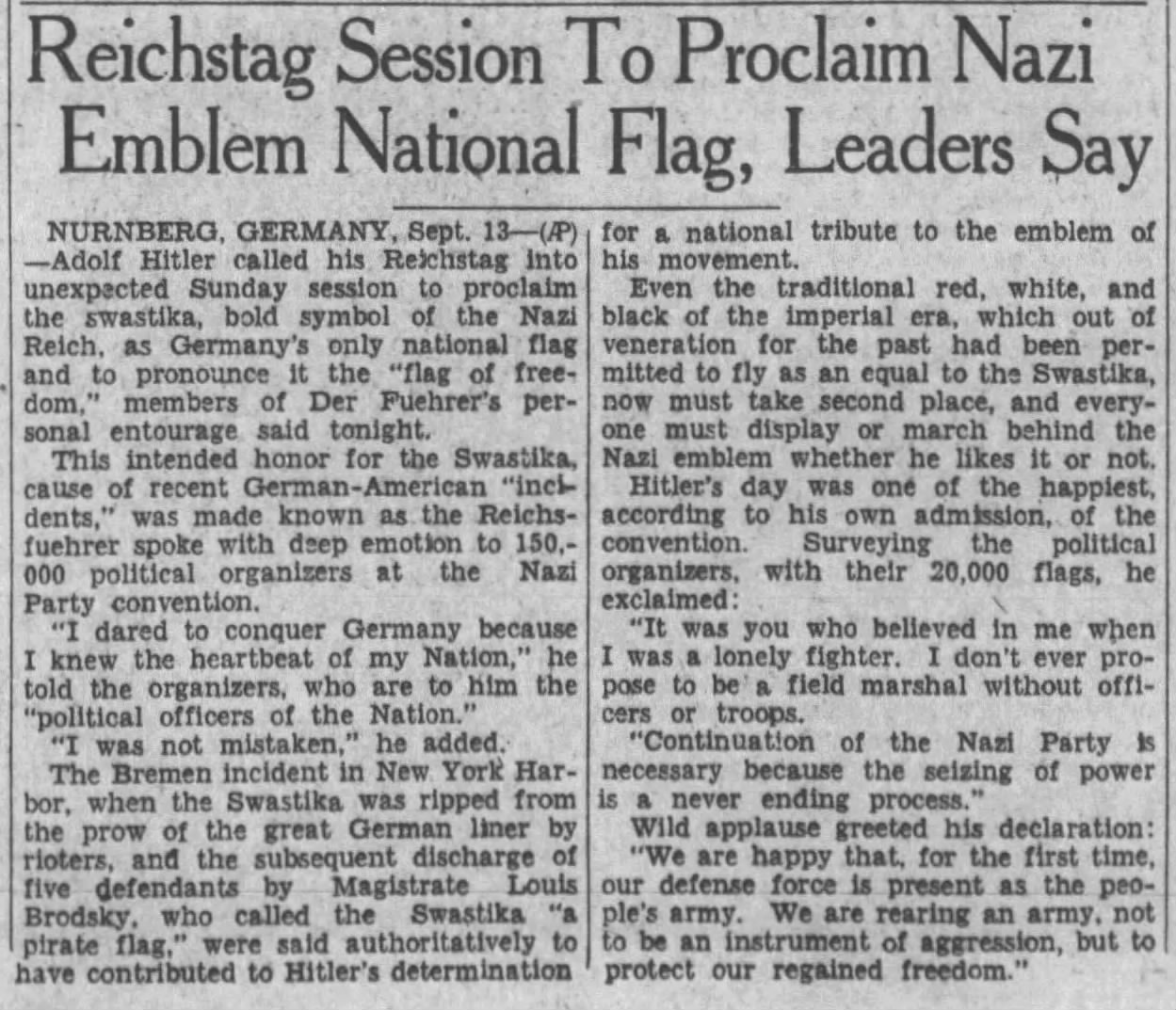- Headline
-
Reichstag Session To Proclaim Nazi Emblem National Flag, Leaders Say
- Publication Date
- Saturday, September 14, 1935
- Historical Event
-
Hitler Announces Nuremberg Race Laws
This database includes 982 articles about this event - Article Type
- Newspaper
- Location
- Page Section and Number
- 1
- Author/Byline
- AP
- Article Text
- NURNBERG, GERMANY, Sept. 13—(AP)—Adolf Hitler called his Reichstag into unexpected Sunday session to proclaim the swastika, bold symbol of the Nazi Reich, as Germany's only national flag and to pronounce it the "flag of freedom, members of Der Fuehrer's personal entourage said tonight.
This intended honor for the Swastika, cause of recent German-American "incidents," was made known as the Reichsfuehrer spoke with deep emotion to 150,000 political organizers at the Nazi Party convention.
"I dared to conquer Germany because I knew the heartbeat of my Nation," he told the organizers, who are to him the "political officers of the Nation."
"I was not mistaken," he added.
The Bremen incident in New York Harbor, when the Swastika was ripped from the prow of the great German liner by rioters, and the subsequent discharge of five defendants by Magistrate Louis Brodsky, who called the Swastika "a pirate flag," were said authoritatively to have contributed to Hitler's determination for a national tribute to the emblem of his movement.
Even the traditional red, white, and black of the imperial era, which out of veneration for the past had been permitted to fly as an equal to the Swastika, now must take second place, and everyone must display or march behind the Nazi emblem whether he likes it or not.
Hitler's day was one of the happiest, according to his own admission, of the convention. Surveying the political organizers, with their 20,000 flags, he exclaimed:
"It was you who believed in me when I was a lonely fighter. I don't ever propose to be a field marshal without officers or troops.
"Continuation of the Nazi Party is necessary because the seizing of power is a never ending process."
Wild applause greeted his declaration:
"We are happy that, for the first time, our defense force is present as the people's army. We are rearing an army, not to be an instrument of aggression, but to protect our regained freedom." - History Unfolded Contributor
- Randall S.
- Location of Research
- Newspapers.com (https://www.newspapers.com)
Learn More about this Historical Event: Hitler Announces Nuremberg Race Laws
- Nuremberg Race Laws: Background (Encyclopedia Article)
- Nuremberg Race Laws: Translation (Encyclopedia Article)
- The Nuremberg Race Laws (The Holocaust: A Learning Site for Students)
- Anti-Jewish Legislation in Pre-War Germany (Encyclopedia Article)
- Racism (Encyclopedia Article)
Bibliography
Burleigh, Michael, and Wolfgang Wippermann. The Racial State: Germany 1933–1945. Cambridge: Cambridge University Press, 1991.
Edelheit, Abraham J., and Hershel Edelheit. "Legislation, Anti-Jewish." In History of the Holocaust: A Handbook and Dictionary, pp. 299–331. Boulder, CO: Westview Press, 1994.
Friedländer, Saul. Nazi Germany and the Jews. New York: HarperCollins, 1997.
Mosse, George L. Toward the Final Solution: A History of European Racism. Madison: University of Wisconsin Press, 1985.
Schleunes, Karl A. The Twisted Road to Auschwitz: Nazi Policy Toward German Jews, 1933–1939. Urbana: University of Illinois Press, 1970.
Wistrich, Robert S. Antisemitism: The Longest Hatred. London: Thames Methuen, 1991.
All articles about this event
Download the full newspaper page
See full image on newspapers.com
Newspaper images provided by Newspapers.com
